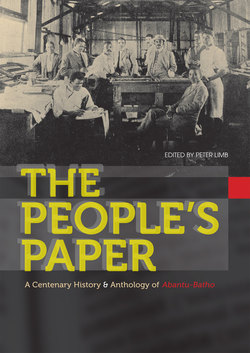Читать книгу The People’s Paper - Christopher Lowe - Страница 19
На сайте Литреса книга снята с продажи.
POLITICS AND THE PRESS: ‘THE BOLDER SPIRITS’
ОглавлениеIf politics is the art of the possible, then Abantu-Batho raised entirely new possibilities for Africans by its boldness. In 1920, speaking of rising black discontent, which many Africans did not openly articulate, Davidson D. T. Jabavu noted that ‘[i]t is only the bolder spirits who have ventured to give the world this secret by means of their scathing criticism in their press (the Abantu-Batho of Johannesburg being the most outspoken organ), and through their deputations to Great Britain’.1 Different editors might from time to time take a more radical or more moderate tack, but the paper’s boldness was never in doubt. In 1913 it challenged the very discourse of white domination as expressed by Prime Minister Louis Botha. The way to banish the spectre of African rebellion
in so far as the natives of this country are concerned, is not, as General Botha told his backveld supporters the other day, namely that his Government would take no nonsense from the Kafirs, but rather that his Government should take the Kafir and bear his nonsense.2
To many white onlookers, including those who claimed academic expertise in ethnography or African language studies – the adjuncts of colonial rule – the paper was simply a tool of agitators. Professor G. P. Lestrade thought it ‘frankly agitatorial’ [sic] and, together with Umsebenzi, one of the ‘very extreme ventures’.3 Yet the politics of Congress – and, indeed, the politics of Abantu-Batho – were extremely complex.
Political representation was always a high priority for the paper. In 1915 it made clear that Parliament should ‘adopt the immutable principle of justice and equality, as the basis of legislative enactment’, and ‘after the conclusion of the present war, the greatest question within the British Empire will be the proper adjustment of the relations between the White and the Natives Races of South Africa’.4 Staff were political journalists and part of a complex ‘web of interdependencies’ that tended to enmesh journalists, parties and owners and, sometimes, ‘cultural and intellectual milieux’.5 Most editors (Robert Grendon was an exception) were at one time or another political office holders and there is no doubt that they accorded prominence to coverage of ANC politics. Ownership was embedded in politics through the shares of Seme and Labotsibeni or Gumede. Direct political influence on editors is harder to ascertain, for the Congresses that made up the ANC at both the national and provincial levels were a mosaic of trends, pulling in different ideological, regional or tactical directions, and editors did mount attacks on some leading ANC figures. Another dimension to this ‘web’ was audience, as editors pitched content at different language readers and the paper was read aloud at meetings.6 Their role as activists was typical of the urban periodical press and mirrored in the cases of Jabavu, Dube and Plaatje, who each took pivotal positions in national and local politics, the press providing them with a ‘great political asset – visibility’.7
